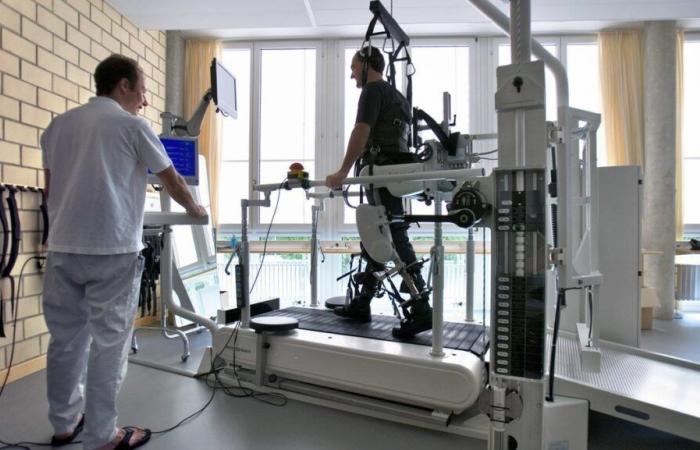The clinical study involved 126 people aged 18 to 70, suffering from either total paraplegia or partial paraplegia due to spinal cord injury.Image: KEYSTONE
An international study carried out by Swiss scientists shows that with certain antibodies, the spinal cord recovers better.
03.01.2025, 16:5803.01.2025, 18:51
Bruno Knellwolf / ch media
The University of Zurich and the Balgrist University Clinic obtained “encouraging results” which they published, along with other European clinics, in the specialist journal The Lancet Neurology.
The clinical study involved 126 people aged 18 to 70, suffering from either total paraplegia or partial paraplegia due to spinal cord injury in the neck. Among them, 78 people were treated with the NG 101 antibody, injected directly into the spinal canal of patients. A complete treatment cycle consisted of six injections parallel to normal hospital treatment.
How does it work?
This antibody blocks a protein unique to the body which, in the event of injury, prevents the regeneration of damaged nerve fibers in the spinal cord. So far, international studies have been able to show that this is possible in animals. Treatment with NG 101 antibodies is intended to slow down the inhibitory mechanisms in the human body and thus enable the recovery of the spinal cord.
In addition to the 78 people who were injected with the antibodies, the researchers conducted a group that received only a placebo. Neither the treated people nor the researchers knew who received the antibody and who received the placebo.
The study looked at the muscles of the hands and arms to determine whether motor functions recovered in patients. It turned out that patients with complete spinal cord paralysis did not benefit from the antibody treatment.
Significant improvement in case of partial paralysis
On the other hand, the group of patients whose paralysis was not complete saw significant improvements, both in voluntary control of paralyzed muscles as in the autonomy of patients in daily life. It turned out that the antibody is generally well tolerated and no side effects related to it have appeared so far, as Balgrist University Hospital writes.
The success of antibody treatment in cases of incomplete spinal cord paralysis must now be confirmed by further studies, write the researchers around Martin Schwab from the University of Zurich and Armin Curt from Balgrist University Hospital. A follow-up study with a more developed antibody has already been announced. This will mainly involve examining patients who, on the basis of the current study, present the greatest potential for recovery, i.e. those who are not completely paraplegic.
The news in Switzerland is here
Most bosses are reluctant to spontaneously increase their employees in Switzerland. Last year, only 34% of employees received more without having to demand it. This is what a survey published Thursday reveals.
A third of employees asked for nothing, and therefore obtained nothing, while 14% had their request for a raise refusedindicates the recruitment firm in a press release. And 11% had to change employers to get better pay.






